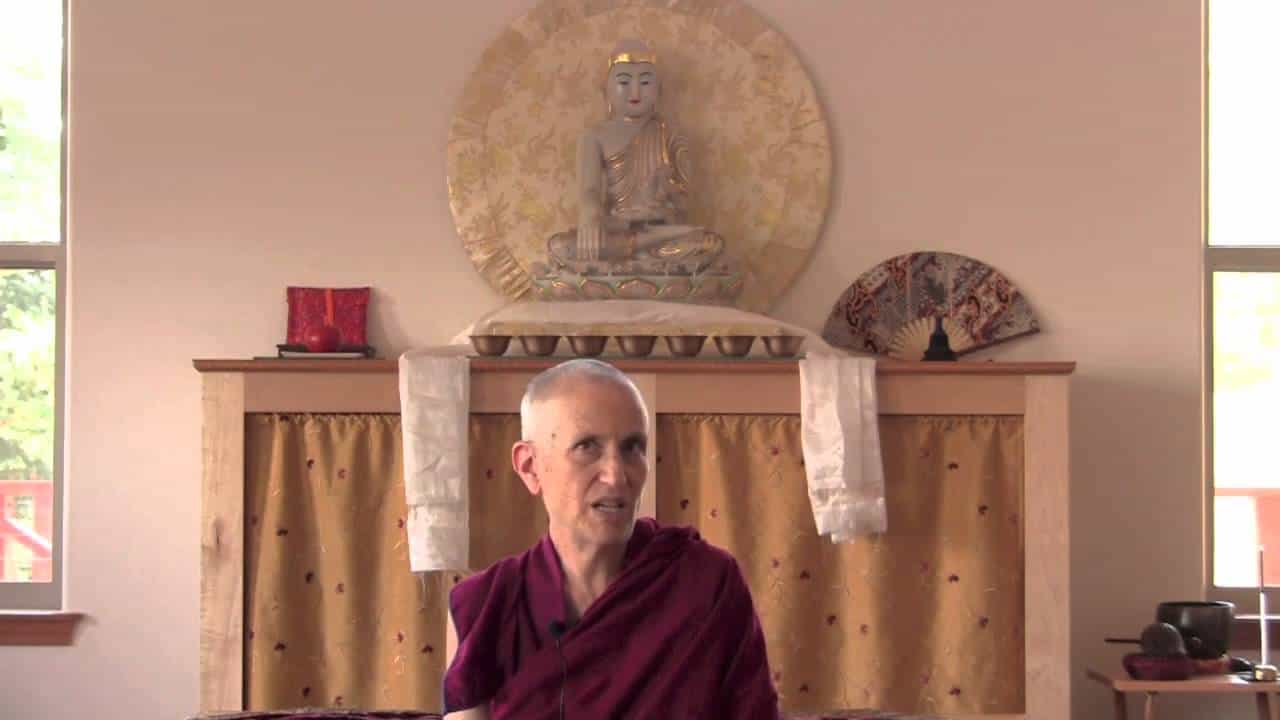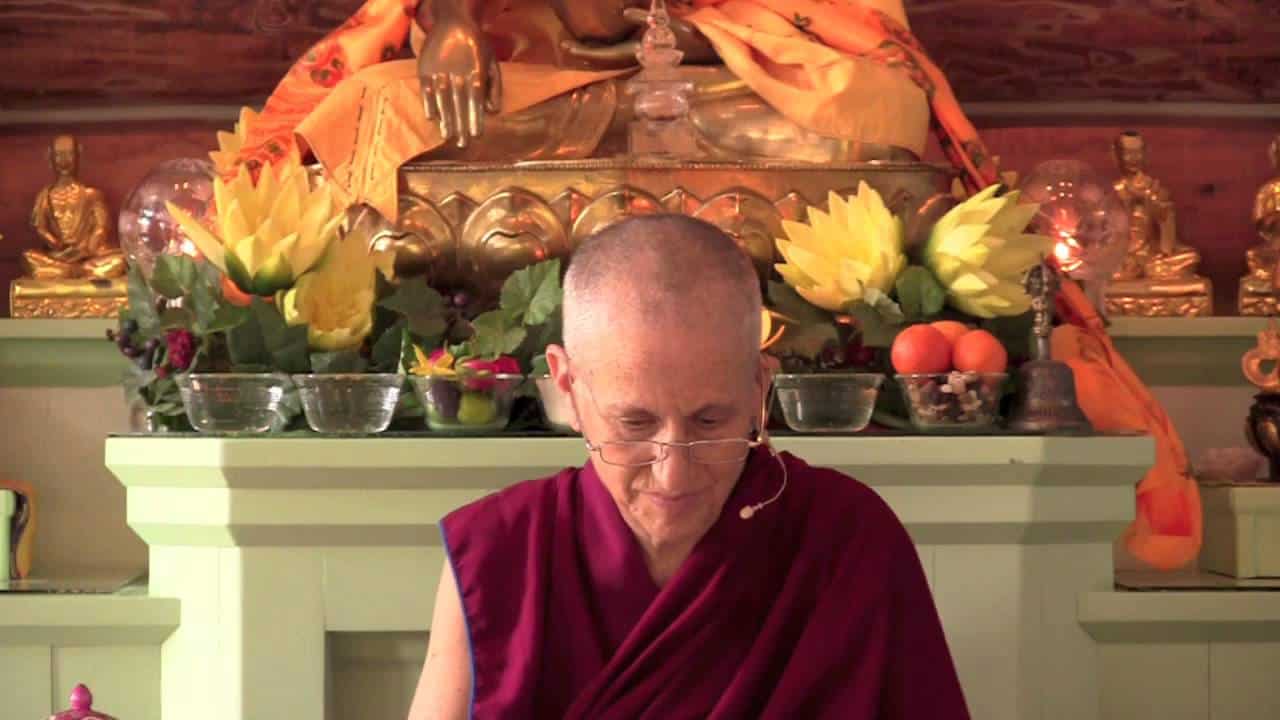Verse 42: The most vain of all beings in the world
Part of a series of talks on Gems of Wisdom, a poem by the Seventh Dalai Lama.
- We use our wealth, possessions, and even our friends to create an image
- Society encourages us to create an image of who we want to be
Gems of Wisdom: Verse 42 (download)
Who are most vain of all beings in the world?
Those who use their wealth and friends merely as external ornaments.
Sometimes we meet people—or sometimes we find a side of ourselves—that that describes. When it says wealth it doesn’t mean you have to be rich. It just means “possessions.” So you use whatever you have to create an image, to give people the idea that this is who you are. And similarly, using friends as contact people: “Oh, I know so-and-so who can get you an ‘in’ with so-and-so, so I must be very important.” You know, the whole name-dropping thing. And who you’re connected to, and, you know, “The lama rode in my car and not your car.” And all this kind of stuff.
We can easily fall prey to that. And society teaches us to do that, because we have an image of the kind of person we want to be, whatever that image is. You want to be an activist, you want to be a mother, you want to be a corporate manager, you want to be an athlete, you want to work in a prison—whatever your thing is. And to do that you have to have certain possessions and drive a certain kind of car to have that kind of career. Don’t you? So you have to make the money from your work to support the possessions that will give you the image so that you can have that job. And when you have that job you also need to have a certain kind of social situation. So you have to have a partner that looks a certain way, that acts a certain way, that is of a certain social class or educational class. And then you have to bring your children up to have that same mentality. And so there’s an image of what you want to be, and then we use people and possessions to create that image and reify that image. And it’s basically, we’re using them in some way or another as ornaments, to create the image of who we want to be, or who we think we should be.
And we can see that when people don’t do this properly, everybody looks at them. I remember at DFF [Dharma Friendship Foundation] there was one doctor in the group. He drove this old, beat up car. And people would like, “What? How can you be a doctor and drive this old, beat up car?” It’s like, you’re not supposed to do that. You’re supposed to look like this and, you know, etc.
And so the hippies, the punks, whatever thing you’re doing, we want to create an image and then we use people and possessions to help us do that.
It’s kind of a form of vanity because we’re not really being sincere with other people I think this verse is really targeting the people who do that to an extreme, who I think we’ve all met. You really get a feel like these people are using you because you know somebody, or you have something, or you’ve done something that adds to their status. So sometimes it’s really obvious. And then sometimes it’s much more subtle.
And then, flip the situation, how about us? Do we do that? Do we have an image of being a certain kind of person. You know, a student at this kind of university. You go to certain universities, again, you have to drive a certain kind of car, have certain kind of partners, and etc. Whereas if you go to that university then you have to have different people and different possessions…. And so, you know, everything.
You know? How much do we do that, too—especially when we’re not sure who we are in the world—to create images and use people and possessions to do that. And it’s kind of empty in the end. Not kind of empty. It’s very empty. [laughter]
One thing that I found very surprising is, many years ago when I was first getting into the Dharma, I had certain friends and we were all there—some were Tibetan friends, some were Western friends—and we were all there and we were all, you know, we don’t know anything, we’re like down at the bottom and everything. And then thirty years later it’s like, oh, my friend is the principal of IBD. Oh my goodness. How did that happen? I knew them when they were like this…. And it’s just kind of this funny thing of how sometimes people you’ve known for many many years you grow up and you have to assume more power or responsibility or whatever it is.
[In response to audience] Yes, that how sometimes people will say, like your example, “Well, now that you’re a nun at the Abbey I have more respect for you.” And you’re going, “Hey, I’m just me.” You know? And, “Don’t conflate me with something else, or develop expectations for me that aren’t realistic.” And so from our side, always having the mind that says, “I’m a student. Until I’m a buddha, I’m a student.” Primarily. We may get put in other roles, but our role is always as a disciple or as a student.
[In response to audience] You’re saying just transferring from one school to another, how you need to create a different image and how do you go about doing that? If I know that idea, that person, this this this…..
It’s useless. Yes. If you’re learning to impress people. [Shakes head]
[In response to audience] So yes, the traps that we can fall into. Because there’s one part of us that has a sincere connection with a teacher. And that’s really genuine. And then there’s another part that loves when other people ask us who our teacher is because when we say “so-and-so” and they go, “Wow!”
“Oh yes, they’re my teacher.” [laughter]
But then the other thing, you’re saying, sometimes the personality of the teacher. You want to elaborate on that? You’re attracted to somebody because of their personality, not because of the teachings?
Audience: Well, you get attached to that. Yeah, this person’s a big deal, this person wrote this book and everything. So that motivation corrupts it.
Venerable Thubten Chodron: Yes, pride. “This is my teacher.” This is what I call this “chai shop gossip.” In India everybody sits around the tea shops and they all talk, “Whose your guru a reincarnation of? My guru is a reincarnation of….” “Well my guru….” And they all talk about who their gurus are reincarnations of and the lineages of their gurus and blah blah blah. And none of the people talk about the teachings. You don’t talk about what your teacher teaches you. it’s kind of, “I have a special teacher that’s blah blah.” Chai shop gossip.
It’s very easy to look at superficial things like that.
Venerable Thubten Chodron
Venerable Chodron emphasizes the practical application of Buddha’s teachings in our daily lives and is especially skilled at explaining them in ways easily understood and practiced by Westerners. She is well known for her warm, humorous, and lucid teachings. She was ordained as a Buddhist nun in 1977 by Kyabje Ling Rinpoche in Dharamsala, India, and in 1986 she received bhikshuni (full) ordination in Taiwan. Read her full bio.


